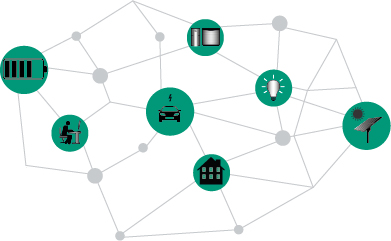| Duration: | 10/2017 - 09/2022 |
| Contracting Authority/ Sponsors: | Federal Ministry of Economics and Energy (BMWi); Federal Ministry of Education and Research (BMBF) |
| Project Partners: | City of Kaiserslautern; Pfaff-Areal Entwicklungsgesellschaft (PEG); Palatina Wohnbau; Fraunhofer Institute for Experimental Software Engineering (IESE); Trier University of Applied Sciences, Environmental Campus Birkenfeld, Institute for Applied Material Flow Management (IfaS); Kaiserslautern University of Applied Sciences, Institute for Sustainable Building and Design; Hochschule Fresenius, Institute for Energy Economics |
| Website: | Pfaff-Reallabor |
| Project Focus: |
EnStadt:Pfaff – Decentralized Energy Management from the Smart Home to the Urban Quarter
In this project, we are developing cooperative software energy agents for several distributed controllable systems (heat pumps, electric cars, battery storage), which communicate with each other and act according to defined rules of trade with high temporal resolution. In doing so, agents pursue the individual goals of their respective users, while also keeping an eye on the neighborhood as an overall system.
A specific goal in the sub-project is the allocation and accounting of energy quantities using block chain technology. It provides the end user with a transparent overview of their current green electricity share and creates incentives for load shifting.
As part of the neighborhood development on the site of the former Pfaff sewing machine factory in Kaiserslautern, the Smart Grids department is investigating energy balancing at building and district level. With the help of agent-based energy management, the current state of the energy system is mapped out at high resolution. Agents create optimized schedules for flexible loads based on their own and third-party forecasts, while taking defined user goals into account. For example, a user can approve his electric car for bidirectional PV-optimized charging to increase the share of renewable energies in his power mix. A holistic approach takes into account the individual hierarchical levels from the smart home device to the neighborhood connection point as well as the sector coupling between electricity, heating & cooling and mobility.
Another key aspect of this work package is the research of block chain technology for neighborhood billing. The measured energy quantities of the individual electrical generators and consumers are recorded in the block chain and distributed among the individual parties using smart contracts according to a defined key. This gives tenants an overview of their current electricity mix and provides them with tokens for green electricity consumed within the neighborhood, which can be used for other services in the area. At the same time, this creates a real incentive for the energy agents to behave in a neighborhood-oriented manner and ensure a balanced energy system.
- Flagship Project EnStadt:Pfaff
- Paper: Stochastic Bottom-up Framework for Load and Flexibility for Agent Based Controls of Energy Communities
- Paper: Agent- and Blockchain-based Energy Management System for Multifamily Housing (Abstract in English)
- Further subproject: EnStadt:Pfaff – Innovative Photovoltaic DC Charging Infrastructure with Buffer Storage

